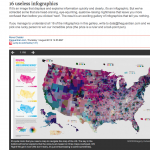Reader’s guide for laymen too elaborate to follow?
Jennifer Raff – ”Scientist, fighter, reader. In pursuit of the extraordinary.” (and blogger, we must add) – recently wrote a blog post with the title How to read and understand a scientific paper: a guide for non-scientists.
Although I think she has a brilliant mind and thatthe initiative is very valuable, my own opinion is that her method is way too thorough and difficult for the targetgroup, i.e. laymen. Take step 3, for example: ”Summarize the background in five sentences or less”. How should a layman be able to do that? And five sentences is not really a concise summary in my eyes.
As a whole, I think that her purpose deserves a lot of credit but also that she has a very idealistic view of the behaviour of knowledge seekers outside of science (where I spend most of my time). Anyway, I am glad that she wrote the article and it inspired me to think of a simplified version, aimed at journalists.

- Claire Price of Crastina receives outreach award from Royal Society of Biology - October 25, 2020
- Agile Science student project at Brussels Engineering School ECAM: “We can’t wait to try it again!” - August 28, 2020
- Create an infographic in the Lifeology SciArt Infographic Challenge - June 16, 2020
- Adam Ruben – The scientist that teaches undergraduate students comedy - March 27, 2020
- Sam Gregson, Bad Boy of Science: “Comedy helps to bridge the gap” - March 10, 2020
- The Coolest Science Merchandise of 2019 - December 16, 2019
- Science Media Centre (UK) offers guide on dealing with online harassment in academia - November 26, 2019
- Agile project management taught to students and researchers at Karolinska Institutet - September 20, 2019
- Stefan Jansson: Improve your credibility! (Crastina Column, September 2019) - September 6, 2019
- The People’s Poet: Silke Kramprich, tech communicator - August 31, 2019





I’d say the blog post is better targeted at undergraduates. When I started my bachelors I used to try reading papers from beginning to end, which was rarely successful!
“she has a very idealistic view of the behaviour of knowledge seekers outside of science”
Agreed. I don’t imagine many laypeople would put in the effort to untangle the contents of a paper in its entirety, and instead would read a blogger’s opinion on it. But famous anti-vaccine or anti-climate change blogs aren’t likely to be bias-free…
In the coilemcatpd world we live in, it’s good to find simple solutions.
There are many flavours of article reading guides. I like the notes of this guy from Stanford (Robert Siegel, Microbiology and Immunology):
http://www.stanford.edu/~siegelr/readingsci.htm
Se Phase I, Phase II etc.!
Yes, it seems a bit too much, but I think it is important for laymen to understand what they would need to do if they would like to argue effectively with scientists on some scientific question. Scientists give years of their life in a community pursuit of truth, never being completely convinced they are absolutely right. Some layman comes and says: “I don’t agree. And it’s my opinion. You don’t know anything!” So, we need some respect of the hard work of understanding scientific questions. (I’m a layman, by the way.)
I’m not wohtry to be in the same forum. ROTFL